Foster 'intervened to keep heat scheme subsidy open'
- Published
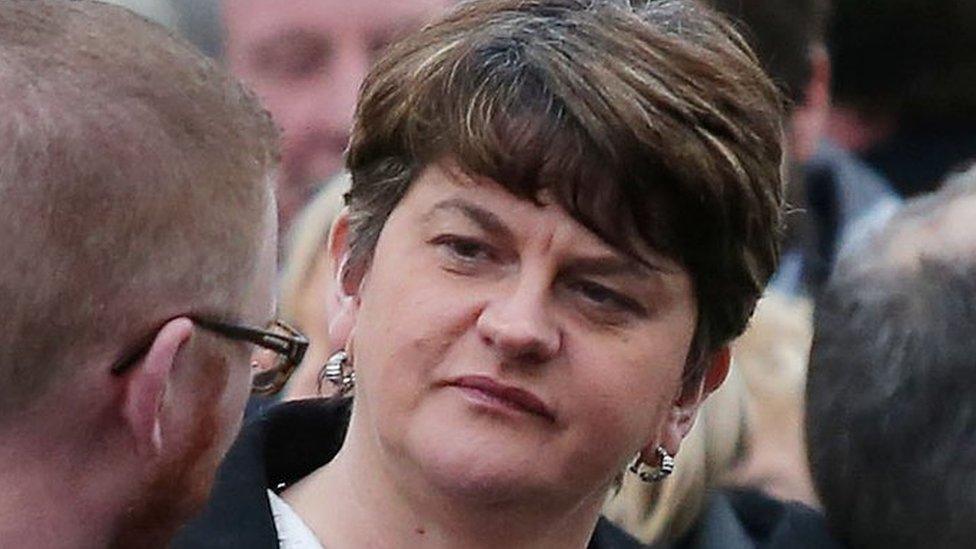
First Minister Arlene Foster personally fought a decision by an executive colleague to close a flawed energy scheme that could cost taxpayers £400m, a senior source has told the BBC.
Overgenerous offers of fuel subsidies meant the Renewable Heat Incentive (RHI) scheme vastly overspent.
The minister in charge planned to close it, but it remained open for two more weeks after Mrs Foster's challenge.
The DUP said Jonathan Bell extended the scheme "following representations".
MLAs will return to the Northern Ireland Assembly on Monday for an urgent discussion on public concerns over the energy scandal.
And Mrs Foster could face a motion of no confidence in her position as first minister if she does not stand aside while the scheme is investigated, the SDLP has said.
But the DUP's deputy leader Nigel Dodds has given her his backing, saying that her opponents are engaged in a "witch-hunt".
Set up by the Department of Enterprise, Trade and Investment (Deti), the RHI scheme offered incentives to businesses and other non-domestic users to install renewable heating systems, mostly burning wood pellets.
But the subsidies it paid out were greater than the cost of the fuel, meaning users could claim more cash the more fuel they burned.
Stormont could have to find about £400m over the next 20 years to cover the overspend.

Renewable Heat Incentive scheme in numbers
1,946 applications were approved under the non-domestic RHI scheme - a 98% approval rate
984 were received in just three months - September to November 2015 - after officials announced plans to cut the subsidy but before the change took effect
The assembly's Public Accounts Committee was told that a subsequent independent audit had found issues at half of the 300 installations inspected
14 of those fell into the most serious category where fraud was suspected
Payments to five of these 14 sites have been suspended

BBC Radio Ulster's The Stephen Nolan Show revealed that Mrs Foster had a "heated conversation" with her DUP colleague Mr Bell, the then enterprise minister, over his plan to end the initiative in January.
Senior civil servants at the Department of Enterprise, Trade and Investment (Deti) had told him that the scheme had to close as it had gone far beyond its budget.
When Mrs Foster intervened, the source said, a deal was struck that saw the scheme remain open for a further 14 days.

Analysis
Chris Buckler Ireland Correspondent
Of course, publicly this scheme was being touted as a success. And Arlene Foster may well have been trying to protect businesses who were investing in boilers and trying to enter the scheme.
It's worth going back to February and looking at how upset politicians from all of the main parties were at the final closure of this scheme. There wasn't the outrage over it remaining open that there is now.
But at that stage for Assembly officials it wasn't about helping businesses or the environment - Stormont simply couldn't afford it. And that delay undoubtedly allowed more firms to enter the scheme, adding to the financial drain on Stormont.

The DUP said Mr Bell kept the scheme open "following representations, including those from other political parties".
The party added: "The first minister and deputy first minister supported this decision in light of the concerns expressed at the time and the fact that cost controls had already been introduced from November 2015.
"Civil servants expressed no objection to the two-week extension in light of the legal dangers of the lack of adequate notification period."

SDLP leader Colum Eastwood said Mrs Foster must account for her role in what he described as "the biggest public finance scandal in the history of devolution".
He called on Sinn Féin, the DUP's executive partners, to sign a no-confidence motion in the first minister, which will need the support of 30 members to go through.
"If [Mrs Foster] will not stand aside, then the assembly must act to remove her from office and fully scrutinise this scandal," Mr Eastwood said.
"She has lost all credibility and anything less will further erode faith in our institutions."
The Stephen Nolan Show also revealed internal emails that suggest civil servants came under pressure from Stormont's Office of the First Minister and Deputy First Minister (OFMDFM) in autumn last year to delay crucial changes to the scheme that could have curbed its costs.
Deti officials became concerned in summer 2015 that the RHI scheme was running out of control and made it clear that it should be closed or at least changed to ensure it did not become unaffordable.
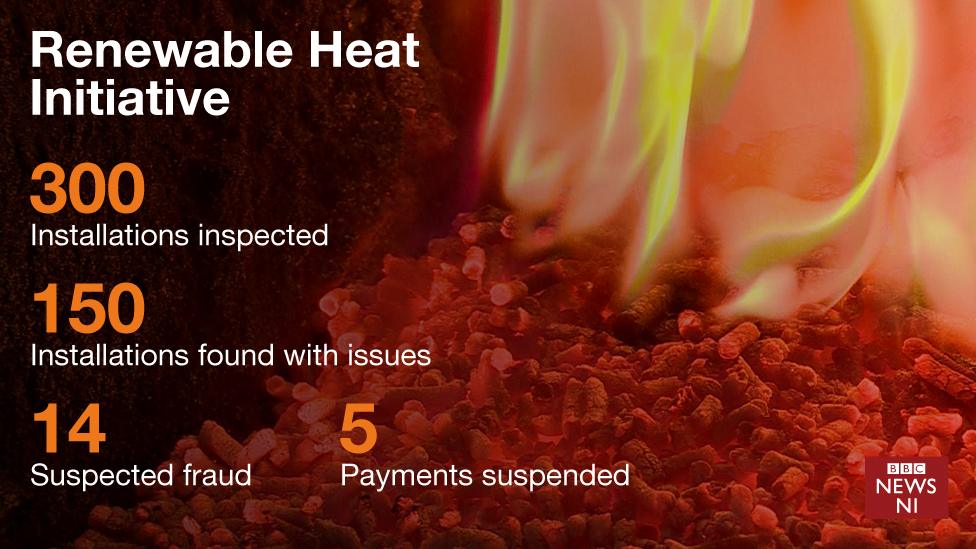
The department's top civil servant Andrew McCormick said he wanted the scheme to be closed in September 2015.
But emails show that Deti staff had concerns that political pressure was applied to keep the original scheme open.
In an email, a DUP official challenged a note of decisions made by the department.
Crucially, the scheme continued unchanged until mid-November.
During that period, there was a spike in applications to the RHI scheme - 429 in October and 452 in November.

Analysis: Why did RHI applications rocket in 10 weeks?
When the spike in applications for the ill-fated RHI scheme took place the minister responsible was mostly away from his desk.
Jonathan Bell had been removed from office by the DUP as part of the rolling resignation policy in response to a Stormont crisis.

The approved applications during those two months are expected to cost the public purse £485m.
Mr McCormick said "wider reluctance delayed the debate" around the scheme and prevented the changes from being made.
In a statement, the DUP said: "For the avoidance of any doubt, no-one at the then OFMDFM sought to delay the closure of the scheme.

The RHI scheme offered claimants £1.60 for every £1 of fuel they burned
"No DUP special advisor or any other individuals from the then OFMDFM sought to prevent the 'closure of the original scheme'."
"Indeed, the date from which the scheme was to be amended and terms of any such amendment of the scheme were a matter for the responsible minister."
- Published13 December 2016
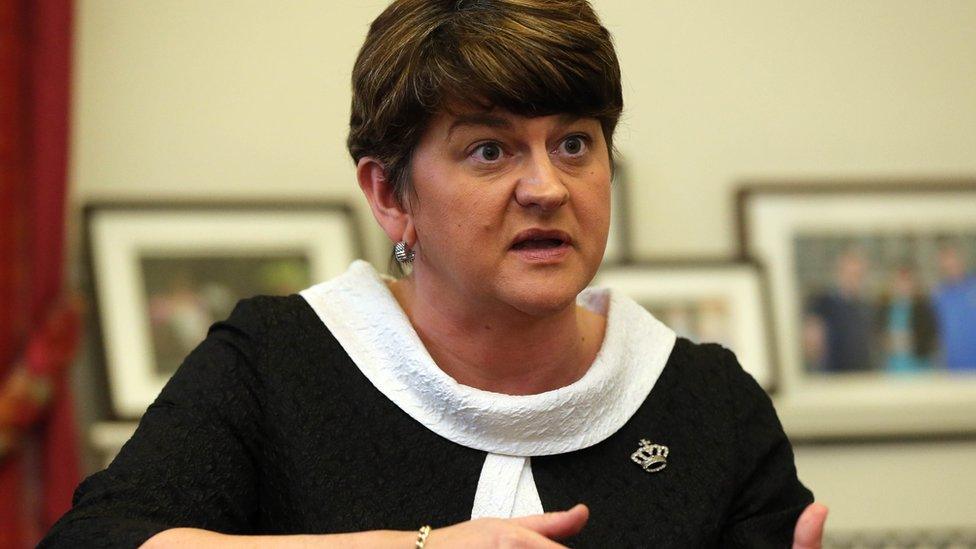
- Published12 December 2016

- Published11 December 2016

- Published8 December 2016
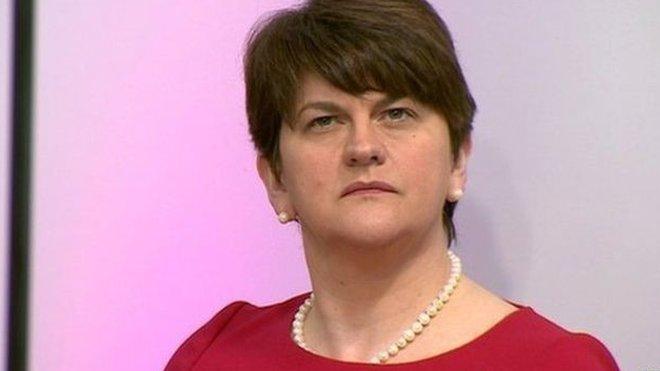
- Published8 December 2016

- Published30 November 2016

- Published9 November 2016

- Published26 October 2016

- Published28 September 2016

- Published19 August 2016
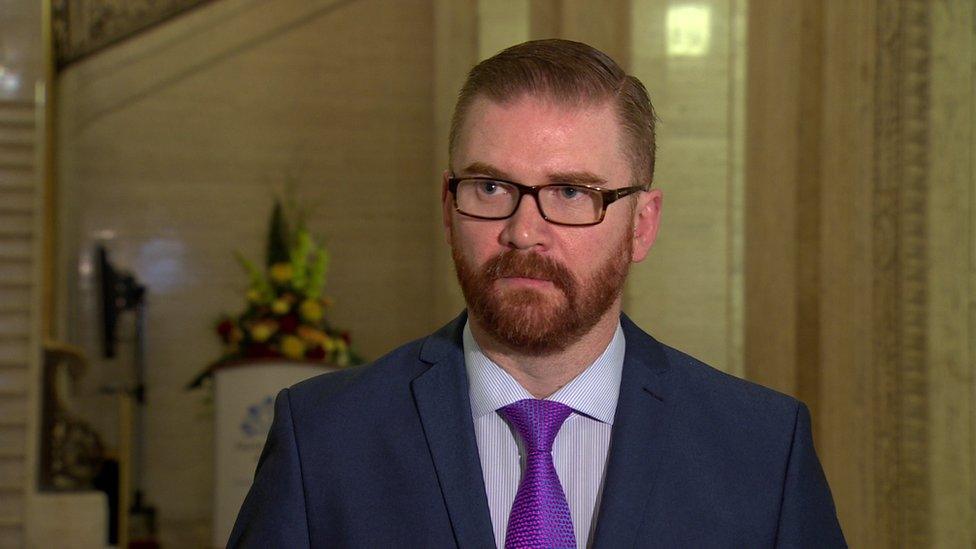
- Published15 August 2016

- Published5 July 2016

- Published9 February 2016
